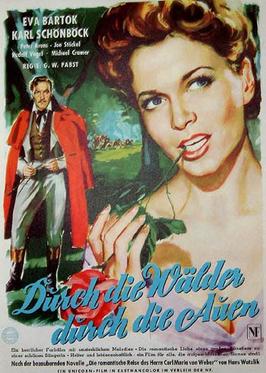
Through the Forests and Through the Trees is a 1956 West German historical comedy film directed by G. W. Pabst and starring Eva Bartok, Peter Arens, and Joe Stöckel. It was Pabst's final film. The film's sets were designed by the art director Ludwig Reiber. It was shot at the Bavaria Studios in Munich and on location in Venice and Zwiesel. It was made in Eastmancolor.

The Marriage of Mr. Mississippi is a 1961 Swiss-West German comedy film directed and co-written by Kurt Hoffmann and starring O.E. Hasse, Johanna von Koczian and Martin Held. It is based on the 1952 play of the same name by Friedrich Dürrenmatt. It was entered into the 11th Berlin International Film Festival. The film was shot at the Spandau Studios in Berlin, and on location in Zurich. The sets were designed by the art directors Hertha Hareiter and Otto Pischinger.
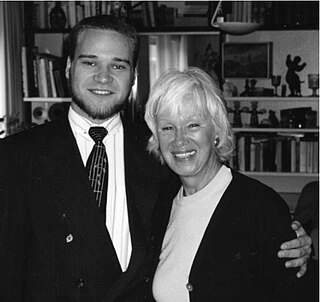
Maria Katharina Helene Sebaldt was a German actress.

Wolfgang Neuss was a German actor and Kabarett artist. Wolfgang Neuss and Wolfgang Müller (1922–1960) were a popular double act. Beginning in the mid-1960s, Neuss also became famous for his political engagement, first for the SPD, then for the extra-parliamentary opposition, APO. He died in 1989 from a longtime cancer.
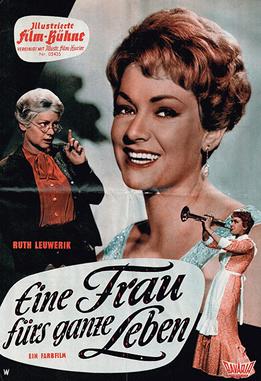
A Woman for Life is a 1960 West German musical comedy film directed by Wolfgang Liebeneiner and starring Ruth Leuwerik, Klausjürgen Wussow, and Harry Meyen.

A Song Goes Round the World is a 1958 West German musical film directed by Géza von Bolváry and starring Hans Reiser, Sabine Sesselmann, and Ruth Stephan. The film is a biopic of the singer and film actor Joseph Schmidt. The title is a reference to his best-known song and a 1933 film of the same title in which he starred.
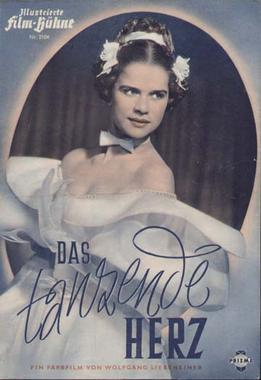
The Dancing Heart is a 1953 West German historical musical comedy film directed by Wolfgang Liebeneiner and starring Gertrud Kückelmann, Gunnar Möller, and Wilfried Seyferth. It was made at the Tempelhof Studios in Berlin. The film was shot using Agfacolor. The film's sets were designed by the art directors Emil Hasler and Walter Kutz.
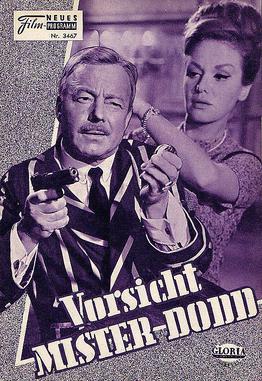
A Mission for Mr. Dodd is a 1964 West German comedy film directed by Günter Gräwert and starring Heinz Rühmann, Maria Sebaldt and Robert Graf. It was shot at the Bavaria Studios in Munich. The film's sets were designed by the art directors Willy Schatz and Robert Stratil. It is based on the 1962 hit West End play Out of Bounds by Arthur Watkyn.
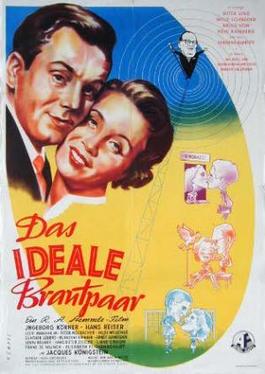
The Perfect Couple is a 1954 West German romantic comedy film directed by Robert A. Stemmle and starring Ingeborg Körner, Hans Reiser, and Peter Mosbacher.

Night of Decision is a 1956 West German drama film directed by Falk Harnack and starring Carl Raddatz, Hilde Krahl and Albert Lieven. It was shot at Göttingen Studios and on location in Belgium. The film's sets were designed by the art directors Walter Haag.

The Last of Mrs. Cheyney is a 1961 comedy film directed by Franz Josef Wild and starring Lilli Palmer, Carlos Thompson and Martin Held. The film was made as a co-production between France, Switzerland and West Germany. It is based on the 1925 play of the same title by the British writer Frederick Lonsdale which has been adapted into films on several occasions.

The Great Test is a 1954 West German drama film directed by Rudolf Jugert and starring Luise Ullrich, Hans Söhnker and Karin Dor. It was shot at the Spandau Studios in West Berlin and on location around the city. The film's sets were designed by the art director Gabriel Pellon.

Sacred Lie is a 1955 West German drama film directed by Wolfgang Liebeneiner and starring Ulla Jacobsson, Karlheinz Böhm and Erwin Strahl. It was shot at the Tempelhof Studios in Berlin. The film's sets were designed by the art directors Ernst Richter and Hans Ledersteger.

The Beautiful Adventure is a 1959 West German comedy film directed by Kurt Hoffmann and starring Liselotte Pulver, Robert Graf and Bruni Löbel.

When the Bells Sound Clearly is a 1959 Austrian comedy drama film directed by Eduard von Borsody and starring Willy Birgel, Ellen Schwiers and Teddy Reno.

Midnight is a 1918 German silent crime film directed by Ewald André Dupont and starring Max Landa, Karl Beckersachs and Reinhold Schünzel.

The Daring Swimmer is a 1957 West German comedy film directed by Karl Anton and starring Gunther Philipp, Susanne Cramer and Walter Gross. It was shot at the Bavaria Studios in Munich. The film's sets were designed by the art directors Wolf Englert and Ernst Richter.

I Learned That in Paris is a 1960 West German musical comedy film directed by Thomas Engel and starring Chris Howland, Christa Williams and Gisela Trowe.
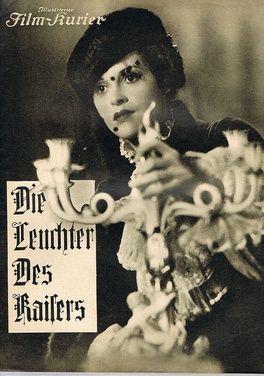
The Emperor's Candlesticks is a 1936 Austrian historical adventure film directed by Karl Hartl and starring Sybille Schmitz, Karl Ludwig Diehl and Friedl Czepa. It is an adaptation of Baroness Orczy's 1899 novel The Emperor's Candlesticks. A Hollywood film version of the story The Emperor's Candlesticks was released the following year.

Blind Justice or Excluded to the Public is a 1961 West German crime drama film directed by Harald Philipp and starring Peter van Eyck, Marianne Koch and Eva Bartok.




















